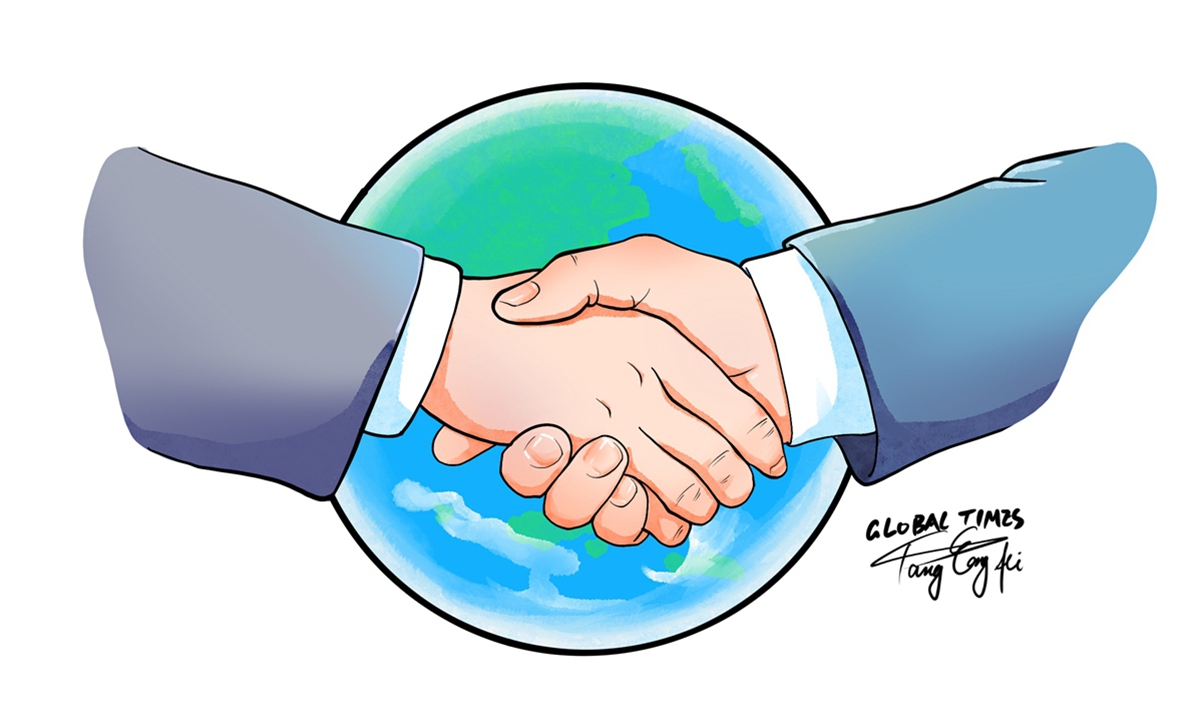
Illustration: Tang Tengfei/GT
Last week, I visited Kenya, an East African country, for the third time. While having dinner at a hotel in Maasai Mara, I encountered many Chinese tourists. One group, comprising around 10 Chinese tourists, was having a birthday party and started singing "Happy Birthday." At that moment, I noticed a middle-aged white woman with blonde hair. She approached the restaurant manager and asked discontentedly, "I have a question. Why are there so many Chinese?"
Any Chinese person hearing this question from the white woman might feel somewhat uncomfortable. Why shouldn't there be many Chinese tourists here? This woman might not know that Kenya has become one of the main destinations for Chinese traveling abroad in recent years. It's perfectly normal for them to have a party at a hotel restaurant.
Perhaps she also doesn't know that the road she traveled on by car to reach Maasai Mara was built by a Chinese company. The fact that she can use a 5G network in such a remote area is also thanks to technology provided by Chinese companies.
When I first traveled from Nairobi to Maasai Mara 14 years ago, there was a long stretch of bumpy road with large sections of dirt and gravel. Now, this road, designated as C12, is a smooth asphalt road. Our driver, Douglas, gave a thumbs-up when we were talking about the highway. In a Maasai village, the villagers told me that with better roads it is much more convenient for their children to get to school. One villager mentioned that he got his first mobile phone just two years ago.
In recent years, road and railway construction has rapidly developed in Kenya. I noticed a significant difference compared to eight years ago when I visited Kenya for the second time: many new and under-construction buildings along the roads, and there is a constant flow of large trucks on the highways. Even in remote towns, you can see young people busy on their mobile phones.
Clearly, Kenya is experiencing an economic boom. In just a decade, Kenya's per capita GDP has doubled, from just over $1,000 to nearly $2,000, making it one of the fastest-growing countries in Africa. The Kenyan pursuit of development aligns with the China-proposed Belt and Road Initiative. Chinese companies are building roads, communication networks and factories here, promoting local economic development.
In May, Kenyan scholar Adhere Cavince wrote for The Nation in an article titled "Why China Became More Popular than the US in Africa": "China's economic engagement with Africa has been extensive and impactful. Unlike the US, which often links its assistance and investment to political conditions such as human rights or governance standards, China focuses solely on economic cooperation."
In recent years, due to Kenya's rapid economic development, investments from Japan, India and the US have also been increasing. These external and internal factors combined have generated unprecedented economic vitality.
In conversations with locals, I learned that both the US and China have provided significant aid to Kenya in the past three years, especially in healthcare.
The US government has repeatedly emphasized its commitment to Kenya and has granted it the status of a "major non-NATO ally."
Of course, for the outside world to truly help African countries like Kenya, the key is to genuinely care about what Kenyans need, provide them with opportunities and motivation for development, and leave them enough room to choose their own path of development.
Currently, US National Security Advisor Jake Sullivan is visiting Beijing. Amid Washington's ongoing strategy of high-tech containment and industrial decoupling with China, Sullivan's visit at least indicates that there are areas where both sides need to cooperate rather than compete.
Africa should indeed become a "base" for cooperation, not a "battleground" for one side to counterbalance the other's influence. From the perspective of common human development, we can find many commonalities in promoting Africa's development and contributing more to the peaceful development of the world.
The author is a senior editor with People's Daily, and currently a senior fellow with the Chongyang Institute for Financial Studies at Renmin University of China. dinggang@globaltimes.com.cn. Follow him on Twitter @dinggangchina




